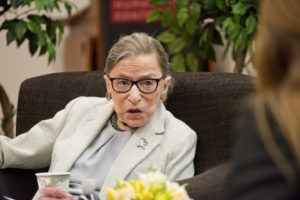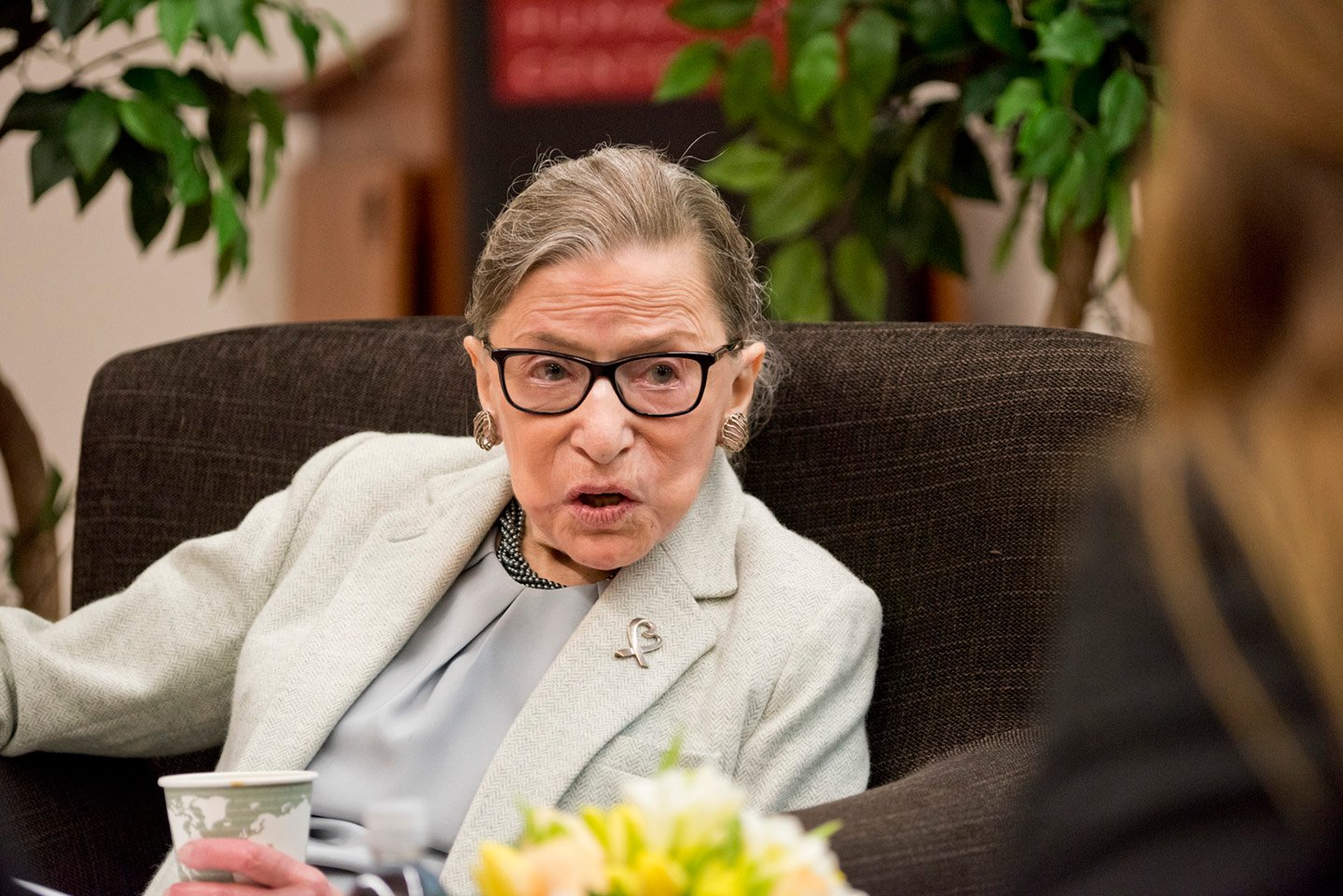Associate Justice Ruth Bader Ginsburg has served on the Supreme Court for over two decades, where she has been an advocate for women’s rights and equality under the law. On her most recent visit to Stanford, Justice Ginsburg delivered the Rathbun Lecture on a Meaningful Life as the 2017 Rathbun Visiting Fellow, a yearly program coordinated by the Office for Religious Life. The Stanford Daily sat down with Justice Ginsburg for her thoughts on gender equality, the justice system and societal progress shortly before her lecture.

The Stanford Daily (TSD): Why did you choose to come to Stanford and speak on what it means to lead a meaningful life?
Ruth Bader Ginsburg (RG): Stanford is a great university and a wonderful city with unusually fine weather. My husband and I and my son lived here from December of 1977 until June of 1978. I enjoyed the university and all its facilities then. And this is a good stopping place for me because I leave the day after tomorrow for Hawaii. I’ve been to Stanford many times since 1978, when my husband was teaching at the law school and I was at the [Center for Advanced Study in the Behavioral Sciences].
TSD: You are a prominent pioneer in advocating gender equality. You have also said that there will be enough women on the Supreme Court when there are nine. What is the measure of gender equality in a society? At what point does a people know that its citizens exist on the same playing field, regardless of gender?
RG: When every boy and every girl in our land grows up thinking that he or she could be whatever his or her God-given talents enable that child to be and not be held back by any artificial barriers. We are much closer to that time now than when I was growing up. In grade school, there was Tom, who was active and building things, and there was Jane, the polite little girl who didn’t get to climb trees or play ball.
TSD: Some people would say that those dynamics and those inequalities still very much exist in society, especially among children. Do you think that people in the United States will ever get to equality and if so, when?
RG: I can’t predict when. Will it happen? Yes. Inevitably. I’ve seen such enormous progress in my own lifetime. I think of the opportunities available to me that were not available to my mother. I think of what life is like for my daughter and for my granddaughters. My mother accelerated to graduate from high school at 15 so that she could help the family survive although the eldest son was off at Cornell University. The idea was that the eldest sons would get the education and the rest of the children would not. What is the difference between a bookkeeper in the garment district and a Supreme Court justice? One generation: the difference between the opportunities open to my mother and those open to me.
I graduated from Columbia Law School. My daughter was then 4. There was only one nursery school in that area that would take a child from 9 a.m. to noon. or 2 p.m. to 5 p.m. My daughter, who teaches at Columbia Law School, when she came back to New York, she had a list of at least 25 full-day daycare centers. My granddaughter, who is now graduating from law school — no doors are closed to her. She has two very good clerkships that she will pursue after she graduates.
The progress I’ve seen in my long life makes me hopeful that we will continue in that direction. One sign of the change I saw in 2011 … [Harvard], this law school that I attended with nine women in a class of over 500, now has a woman president, Drew Faust. I was getting an honorary degree and Ellen Johnson Sirleaf, the first woman to be president of an African country, was the graduation speaker. That photograph is, for me, a sign of how much has changed. Of course we haven’t reached nirvana, but we’ve come a very long way.
TSD: What advice do you have for current young people hoping to perpetuate this trend of progression?
RG: Whatever paid work you pursue, do something outside of yourself that you really care about, that you are passionate about. Whether it’s the environment [or] discrimination. Do something that will make life a little better for people less fortunate than you.
I’ve said to young lawyers, “Look, all you do is get a good job. You’re like a plumber: You get a skill and then you practice that skill. But you’ll never be a professional unless you use your talent to help repair tears in the community in which you live.”
TSD: How have your values informed your views on justice and the law? How have you navigated your life as a public figure in relation to your foundational personal and civic values?
RG: In my life, I was fantastically lucky that the climate had changed by the ’70s so women and men were feminists as well. The message that they were conveying goes way back to Abigail Adams. The message didn’t change but society’s readiness to listen did change. And to be a mother and a lawyer just at that time, in the 1970s, was a tremendous stroke of fortune for me.
This transcript has been lightly edited and condensed.
Contact Miguel Samano at msamano ‘at’ stanford.edu and Courtney Douglas at ccd4 ‘at’ stanford.edu.
